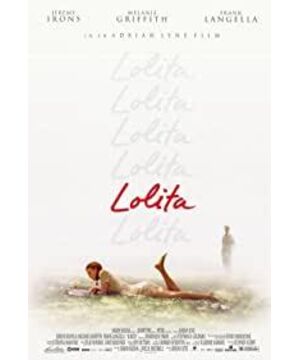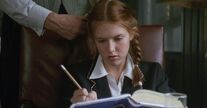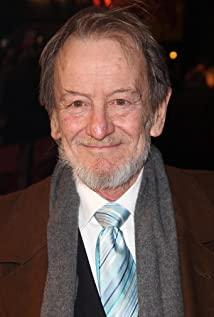The 97 version of "Lolita" can be said to have won my heart. Humbert's love for Lolita begins with lust and ends with death. I have always liked this kind of reckless love. Things that are difficult to do in reality are always found in books and movies. Just like Zweig's "Letter from a Strange Woman", it is as warm and deep, indelible until death. In this short film of more than two hours, the director interspersed a large number of Humbert's confessions in the book. Through the screen, he is no longer a pedophile pervert, but a person who cannot extricate himself from the charm of the demon boy. Tired man. And Kubrick's "Lolita" lacks this sympathy, and is more cold and silent criticism. Under Kubrick's camera, Humbert is cold and annoying, even if he finally It seemed a bit ridiculous to beg Lolita to come with him. Different perspectives make the presentation of the same character so different. Kubrick has been dubbed "Kubrick" for his extremely high directing talent, but this time I think Kubrick has lost. The reason why "Lolita" is "Lolita" is precisely because It offers a different perspective - seeing the whole thing through Humbert's eyes. The library version is more criticized from the perspective of ordinary people. Therefore, the styles of the two films are very different.
One of the most successful aspects of the 97 version is its casting. Jeremy Irons' Humbert is tall and handsome, and the most attractive thing is his eyes, which always looks vulnerable and innocent. Every time Humbert hurts Lolita, he always looks innocent and flustered, making people hate it. And Lolita played by Swain is seven parts innocence, three parts coquettish and dusty. Childishness is the biggest feature of this version of Lolita. In comparison, the actress chosen by the library version is more like Lolita in the eyes of ordinary people, the most beautiful of all children, but not the "sexy girl" in Nabokov's writings. In short, such a configuration naturally makes the audience sympathize with Humbert.
In addition, the order of the narrative is also worth pondering. The 97 edition begins with a car driving alone on the road, surrounded by endless fields. As the camera progressed, it became known that this was the scene before Humbert was arrested. This sets a sad tone for the entire film. The library version also adopted an interlude method to advance the plot of Humbert's assassination of Quilty. Unlike the thriller in the assassination scene of the 97th version, the library version is humorous and ironic. The dissolution of the meaning of Burt's assassination turned the whole assassination into a burlesque, showing the director's ironic attitude towards the whole thing. Next, it is a normal sequence of narration. The two films also start the narrative from Humbert renting the house of Lolita. The length and focus of the plot in the middle are also different, but in general, the library version is very good for Humbert. Ironically, the 97 version is mostly from Humbert's point of view, but also from the sidelines.
Allusions to patriarchy
It seems that the discussion of patriarchy has never ceased in Western literature. The story of Oedipus has been talked about so far, and Freud explained this as the tendency of Oedipus to kill his father in his heart. In the two editions of "Lolita", Humbert's desire to control Lolita is emphasized. Although Humbert's control of Lolita is psychologically expressed as jealousy between lovers, its form is Use of patriarchy. Let’s see how Humbert tightly controlled Lolita in the later period. The most important thing is the economy. The lack of economic independence makes Lolita unable to escape Humbert even though he has the will, and the second is the relationship with his contacts and itinerary. control. The 97 version of Lolita uses herself as a bait to press Humbert tightly to escape his control, while the library version only shows Lolita's aversion to control. On the one hand, there is a tall and powerful man, and on the other hand, there is a little girl who is suppressed and unable to resist.
About Quilty
Quilty has a lot of roles in the 97 version and the library version. However, the performance and role of Quildi in the two versions are different. In the library version, in order to show the absurdity of the whole thing, the director moved the plot of the assassination of Quildie in advance. Ended in a farce chase. In the middle of the film, Quilty has been interspersed, like a shadow shrouded between Humbert and Lolita. In this version, the presence of Quilty adds to Humbert's absurdity. In the final scene of the assassination, Quilty hides behind a painting, and his screams hit the girl's face at the end of the painting. Stopped in one shot, hinting at the essence of what Humbert did.
In the 97 version of the assassination plot, the director did not completely dissolve the farce of the assassination, but in the contrast version, the director added Humbert's tragedy. When Quilty said he was impotent, Humbert's In desperation, he said, "You have deceived my redemption, and you must die." It is clear that Quildie is another Humbert, and in Humbert's imagination, he kills Quildie and Like killing the one who hurt Lolita, this is his last redemption. When this redemption disappeared, he was completely desperate. Under the camera, Humbert, played by Irons, kills Quilty with despair and madness, while the blood-stained piano and the still-sounding sound suggest that everything is like an illusion, including this ridiculous massacre in the name of revenge. . So in version 97 Quilty is another Humbert who takes Lolita but can't possess her, just like Humbert who takes Lolita but never really owns her, Quilty The existence of Erdi makes the image of Humbert even more tragic.
about love
This leads to the next topic, which is how to understand Humbert's love for Lolita. When talking about the novel, Yu Xiaodan, the translator of "Lolita", believed that Humbert's love for Lolita was essentially the eternal pursuit of time. In the end, he finally realized that Lolita would grow up, and what he was pursuing was nothing but an illusion. In the 97 version of the film, Humbert's unrequited mood is shown very implicitly and sadly. Judging from the presentation of the 97th edition, I prefer to understand it as a story that cannot be loved. Humbert loves Lolita deeply and gives everything for Lolita, but Lolita treats him with disdain. When did his affection for Lolita change from lust to love? Maybe when he decided to stay, maybe earlier. The most memorable is the scene before Humbert was arrested. He looked at the town down the mountain, and his inner monologue sounded: "I heard the children's laughter and laughter, and it wasn't Lolita that made me disheartened. Not by my side, but without her in the laughter here." And then a close-up of a face, bloodied and weary and desperate, that is the best comment on what he's been chasing and loving all his life.
So instead of a story about a pedophile getting punished, the film is about a chaser who gets what he wants, and Lolita is a symbol of all good things. "She can fade or wither, I don't care. But I only need to look at her, and all the tenderness will come to my heart." No matter how she changes, in the hearts of pursuers, it will never fade.
View more about Lolita reviews











